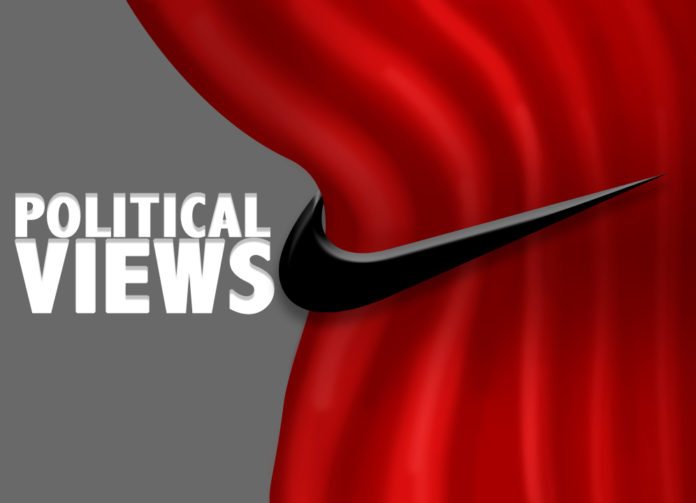Nike sparked controversy last week with an ad featuring former NFL quarterback Colin Kaepernick’s face behind the words, “Believe in something, even if it means sacrificing everything.”
When corporations like take political stances on polarizing issues such as police brutality or LGBTQ rights, they often garner strong support or protest. Corporations exist because of consumers. Therefore, our response to their political agendas matters. Nike’s controversial ad campaign provides an opportunity for consumers to exercise intentionality in their purchases. Those in favor of Nike’s stance can support the corporation’s actions through their finances, and those against can boycott the company’s products.
Kaepernick gained media attention in 2016 when he knelt during the national anthem at the beginning of his football games in protest of police brutality against minorities. Kaepernick’s actions quickly brought him into the limelight as a political symbol for the movement. Many viewed Kaepernick’s protests as an admirable expression of his First Amendment rights. Others condemned his actions as blatant disrespect toward the United States and the nation’s flag.
In response to the advertisement, many consumers with the latter viewpoint began tearing the swooshes off their Nike gear in protest of the company’s explicitly political advertisement. Others with the former perspective praised Nike for supporting Kaepernick and his protests against police brutality.
One positive element of Nike’s ad campaign is that it has given consumers the opportunity to make purchases with political ideologies in mind.
Many corporations remain politically secretive or support causes that are virtually universally viewed as positive such as hunger relief or education. Financial support offered to these charities by corporations is undoubtedly positive. However, companies that are outspoken in their more controversial political beliefs truly utilize their platforms in ways that promote political, social and moral causes they support.
Nike has been exemplary in its political outspokenness about more issues than police brutality against minorities. Last year, Nike launched a campaign in support of Pride Month that was accompanied by clothing with rainbow graphics and a “BeTrue” sneakers line that featured a pink triangle logo — a symbol for many LGBTQ identities. Nike has also been public about matching donations to Planned Parenthood. The Kaepernick advertisement only reiterated Nike’s long-established and highly publicized leftist political values.
Other companies have received similar scrutiny for their outspoken political views. For example, In-N-Out sparked controversy when it donate $25,000 to the California GOP. Politicians and other In-N-Out consumers called for a boycott of the right-leaning corporation. J. C. Penny went under fire from anti-gay groups when the company named lesbian talk show host Ellen DeGeneres as the company spokeswoman in 2012. Depending on a particular consumer’s preferences, decisions can be made about which organizations to support (likely ones that agree politically with the individual in question) and boycott (likely ones that disagree politically with the individual in question).
Regardless of one’s position on Kaepernick’s protests or Nike’s advertisement in support of him, customers now better understand the company’s political positions. Consumers can then evaluate how those views compare to their own to inform if or how one engages with Nike in the future. However, this intentional consumerism should go applied to issues far deeper than flashy political statements.
Nike has a long history of child labor and over the past few years, similar issues may have re-emerged wearing a new mask. Nike recently discontinued programs that enabled workers to express their concerns and external investigators to review labor practices in Nike’s supplier factories.
Rather than tearing the logo off Nike gear, this controversy has hopefully compelled consumers to be more intentional with their purchases by researching which businesses support political causes that align with their own and, more importantly, uphold high moral standards expected of companies in the 21st century.






